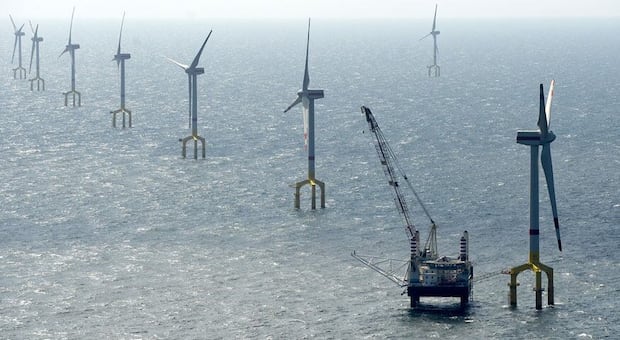Nova ScotiaPremier Tim Houston made his pitch for a massive buildout of offshore wind to a friendly crowd Wednesday, but his ambitious expectations were put into perspective by an account of Germany’s slow and bumpy path into the industry.It took Germany more than two decades to get offshore wind turbines spinningTaryn Grant · CBC News · Posted: Sep 24, 2025 1:37 PM EDT | Last Updated: 3 hours agoThe German wind farm BARD Offshore 1, seen 100 kilometres off the island of Borkum in this file photo. A representative from a German offshore wind organization spoke in Halifax on Wednesday. (Fabian Bimmer/Reuters)Premier Tim Houston made his pitch for a massive buildout of offshore wind to a friendly crowd Wednesday, but his ambitious expectations were put into perspective by an account of Germany’s slow and bumpy path into the industry.In a hotel ballroom in downtown Halifax, Houston had a rapt audience that included offshore developers, academics and government officials attending an offshore wind forum put on by Net Zero Atlantic, a non-profit renewable energy research group based in Halifax.”We can, together, unlock the potential of, really, one of the world’s greatest untapped resources. That’s what we have,” Houston said.The premier made the case for the project he calls “Wind West” the same way he’s done many times in recent months, framing it as a means to provide clean energy to jurisdictions across North America while boosting Nova Scotia’s economy.He added to his argument Wednesday the province’s recent budget update, which put the deficit over $1.2 billion, as a reason to charge ahead with the development of offshore wind farms and new transmission lines to export the electricity.Premier Tim Houston spoke at an offshore wind research and development forum in Halifax on Wednesday. (Dan Jardine/CBC)”We know it’s going to be hard work … but we know that the benefits are so significant.”Just before Houston took the stage, Philipp Tremer gave a keynote address that described some of the hard work Germany had to do to develop offshore wind in its waters.Germany’s ups and downsTremer, project manager at the non-profit German Offshore Wind Energy Foundation, said it took Germany 23 years from the time of the first application to get its first turbines generating electricity.He said there have been several ups and downs for German offshore wind, and just this summer there was a failed auction for new licences. He said Germany is at a crossroads and needs to rethink the way it regulates the industry, and lower its expectations for expansion.Philipp Tremer, project manager at the non-profit German Offshore Wind Energy Foundation, urged Nova Scotia to not move too fast. (Dan Jardine/CBC)Germany has around nine gigawatts of installed capacity and is aiming for 30 gigawatts by 2030.Houston is aiming for five gigawatts by 2033 and 15 gigawatts by 2040. Nova Scotia’s energy demand currently peaks around 2.4 gigawatts.”It is possible, for sure, but don’t move too fast,” Tremer said in an interview following his address.Tremer said 10 years is the average ramp-up time.He said it’s important to give ample time for investigations into how offshore development could impact the environment, and to work on community buy-in, which he called “acceptance work.”He said there were many delays to German projects caused by “interest groups” going to the courts to try to prevent projects from going ahead.”This is also a lesson learned: Include the public in a really early stage,” he said.The need for government subsidyTremer said Germany “highly subsidized” its first projects and did not see any government revenues for 13 years.He said he thinks that approach is necessary in order to establish the industry.”I have not seen any market where it worked without high subsidies.”Houston has said he expects a combination of investment from provincial and federal governments as well as private industry. He’s proposing the province take a four per cent royalty on all production.ABOUT THE AUTHORTaryn Grant covers daily news for CBC Nova Scotia, with a particular interest in housing and homelessness, education, and health care. You can email her with tips and feedback at taryn.grant@cbc.ca
‘Don’t move too fast’: Advice from Germany to N.S. on offshore wind











